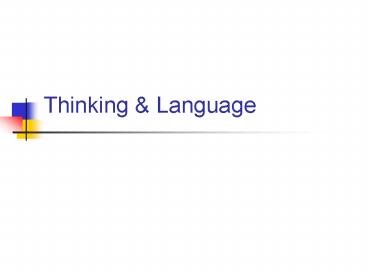Thinking - PowerPoint PPT Presentation
1 / 18
Title:
Thinking
Description:
Thinking & Language – PowerPoint PPT presentation
Number of Views:43
Avg rating:3.0/5.0
Title: Thinking
1
Thinking Language
2
Obstacles to problem solving
3
Confirmation bias
- Looking for and accepting evidence that supports
our preconceived ideas. - Dont bother me with the facts,I have made up my
mind. - Makes it difficult to consider contradictory
information.
4
Fixation
- Inability to see a problem from a new viewpoint.
5
Mental set
- We see what we expect
- What worked in the past
- Makes it difficult to see a problem differently.
6
Functional fixedness
- Seeing things only one way
- Makes it difficult to see different uses for
things.
7
Heuristics
- Mental shortcuts
- Often helpful, but can cause problems.
8
Heuristics
- Representativeness
- This person is representative of (similar to)
this group. - Therefore, he has these characteristics
- Availability
- An available (memorable) clear powerful memory is
more powerful than a statistical reality. - We over feel and under think
- E.g. Deaths from 9/11 VS smoking
9
Heuristics
- Overconfidence
- Overestimating the accuracy of our judgments and
performance. - Stock purchases - E.g. E-trade, or Charles Schwab
online trades - Reality rarely reduces their overconfidence in
the next situation.
10
Heuristics
- Belief perseverance
- When given mixed evidence, two opposing parties
will actually increase their disagreement. - Each party will view the evidence in a way that
further supports their preexisting beliefs. - Prejudice persists because once formed, opposing
evidence is rejected. - What you can do Consider the opposite (or argue
the others point of view. - E.g. Family therapy
11
Framing
- We judge things differently based on how the
information is presented. - 10 die VS. 90 survival rate of an operation
- Aid to the needy vs.Welfare
- Cloning vs. Nuclear cell transfer
- Opt in vs. Opt out
- Divorce Sin vs. independence
- You can change peoples perception of a situation
by reframing it.
12
Fear
- We fear
- 1. What evolution and our ancestral history
prepared us to fear. - E.g. heights and spiders
- 2. What we can not control
- E.g. Tandem jump VS static line
- 3. What is immediate VS. long term
- E.g. flying vs. smoking.
- 4. What is most memorable
- E.g. 9/11 vs. traffic deaths
- Bill gates quote
- Result Check your fears against the facts
13
Thought problems to avoid
- 1. Hindsight bias
- I knew it all along.
- 2. Illusory correlation
- Thinking 2 things are related when they are not.
- E.g. adoption and pregnancy
- 3. Memory Construction
- Misinformation can create false memories
14
Thought problems to avoid
- Overconfidence
- We tend to overestimate our own abilities and
underestimate others. - Belief perseverance conformation bias
- Beliefs remain even when discredited
- E.g. We believe only what supports our
preexisting beliefs - Prejudice?
15
Thought problems to avoid
- Self serving bias
- Inflated self assessments
- E.g. If I do well I take the credit
- If I do poorly, others are to blame
- Fundamental attribution error
- Attributing behavior of others to their
disposition (personality) and ignoring the
environment. - E.g. The homeless person is just lazy
16
Thinking with images (procedures) not words
- Thinking with words, What do I need to do
today. - Thinking with images
- Turning on the cold water
- Riding a bicycle
17
Thinking with images (procedures) not words
- Visualizing thinking about an activity
stimulates the same brain centers as actually
performing the activity. - Playing the piano
- Gymnastics
- Golf
- Olympic athletes
- Spend time visualizing your completing the task,
not just the destination. - E.g. Gymnastic gold medal
18
Much information processing occurs beyond
consciousness and language.































